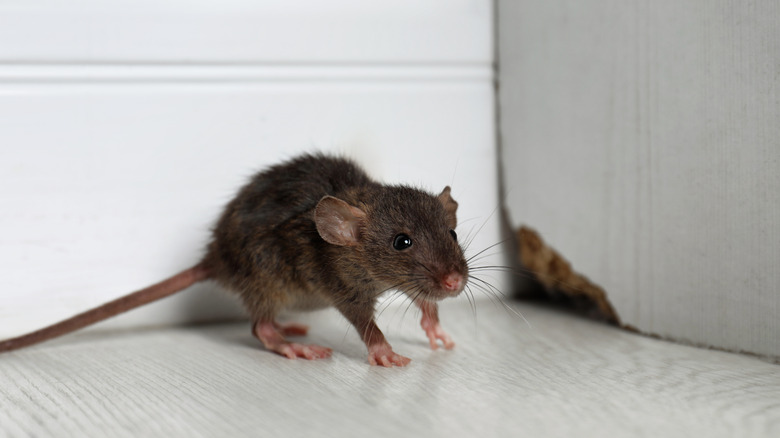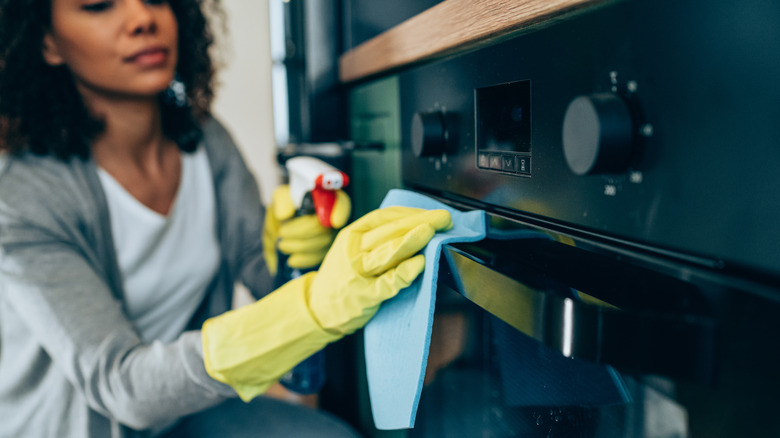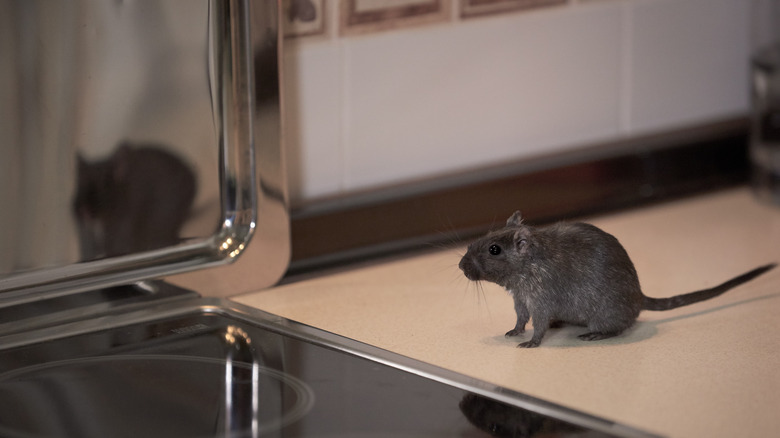Signs Of A Mouse Problem In Your Oven (& How To Get Rid Of Them)
We may receive a commission on purchases made from links.
What do leptospirosis, hantavirus, Tularemia, Salmonella, and lymphocytic choriomeningitis (LCMV) all have in common? Mice carry these diseases, and that's why you don't want them in your home. Aside from the series of dangerous pathogens rodents transport, they can also chew wires, ruin appliances, and even start electrical fires. One appliance mice seem to gravitate toward is the oven. These spaces are warm and have residual food particles, making them ideal for tiny critters. If you're unsure if you have a mouse problem in the oven, check for any of the following signs of a pest infestation: mouse droppings, tiny rodent footprints, urine, damaged wiring, nests, and noises.
Mouse droppings have a specific shape. They're between an ⅛ and a ⅛ inch long and look like rice, albeit a bit thicker and dark-colored. They also have tapered ends that give them their distinct appearance. Once you've identified the mouse droppings, it's important to avoid using harsh chemicals in an appliance that cooks food, so opt for a natural alternative, like white vinegar, instead. Also, look for other evidence, such as paw prints. Mice footprints are very tiny — smaller than ½-inch in length. Additionally, consider how your oven is working. Is it malfunctioning? If so, a mouse may have chewed wires. Look for signs of damage or contact a professional to inspect for wiring-related issues.
Steps to clean your oven and kitchen
If you find any inclination of mice in your oven, don't use it until it's been thoroughly disinfected. Although a mixture of bleach and water is commonly recommended to disinfect areas affected by mouse infestations, you don't want to use this where you cook and prepare food. Instead, mix equal parts dish soap, water, and vinegar, spray it in your oven, let sit for several hours, and wipe it away. Just be mindful that any mouse droppings should be wet before removal — this works to prevent pathogens from becoming airborne. Wear gloves and a mask and throw everything away outside in a sealed plastic bag.
Once clean, you'll need to take steps to disinfect the rest of your kitchen. Mice in the oven probably means they were walking about the rest of your space, so thoroughly spray everything down with the same cleaning solution. But this is only part of the solution. Make your kitchen as unappealing to mice as possible — clean it frequently, remove all crumbs from counters, and vacuum and mop daily. If you have loose food out on counters, move it to closed containers. Put pantry items in sealed containers as well. The same holds true for pet food on the floor. Mice like to store food in their nests, so having easy access to meals makes it a breeze for them to transport items to your oven. Put your pets on a feeding schedule and don't leave food out.
Get rid of mice humanely
To keep mice at bay, it's important to clean your oven at least once a week. You can use the same water, dish soap, and vinegar method used to disinfect it from an infestation. But a clean oven doesn't mean that your mouse problem is resolved. Although there are plenty of secret weapon hacks to keep mice and pests out of the home, it's important to do so humanely. Avoid bait stations that lure rodents in to ingest poison. It can take 10 days for poison to kill rodents, making it extremely inhumane. Even worse, if you have children or pets, you're exposing them to highly dangerous poisons that need to be stored out of reach — one dose is enough to cause serious health complications (via the National Pesticide Information Center). Even a mixture of peanut butter and baking soda is harmful and toxic to pets when eaten, and glue traps are a cruel way to remove mice and should never be used.
A safer alternative is the catch-and-release bucket lids from Amazon for $24. Check these traps throughout the day and don't use them during extreme temperatures. If the infestation is in your kitchen, place these near your oven. Mice are nocturnal, so put them out after you go to bed. If you don't want catch-and-release, use snap traps as they're the most humane. To repel them, spray peppermint oil around your home's perimeter as they hate the smell.


